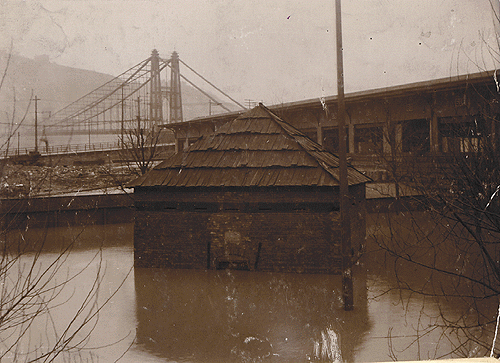

Propose New Location for Relic: May Move Blockhouse to Beautify the
Point: Director
Armstrong Wants It Where It Can Be Seen--Ordinance for Bridge Design
Competition.
From The Pittsburgh Post, 20 December 1911.
The historic
old block house at the Point will be
removed from its present location in a depressed portion of the district,
taken nearer to the junction of the Allegheny and Monongahela rivers, and
boosted to a prominent elevation, where it can be seen for miles, if
Public Works Director Joseph G. Armstrong has his way. This idea is to be
considered in connection with the beautification of the entire Point
district, which is being undertaken by the art and planning commissions.
Director Armstrong had an ordinance presented in council yesterday
authorizing an advertisement for competitive plans for an ornamental
approach to the new bridge over the Allegheny river at the Point.
"We are going to fix up the Point," said Director Armstrong, yesterday
afternoon. "What is the use of having the blockhouse hidden away where no
one can see it. It would not be necessary to move it far to make it
visible for many miles down the river. It would then become prominent as
an object of historical interest."
Storm of Protest Aroused among Local D. A. R. by Suggestion That
Fort's Site Be Changed. "Sorry," Says Director.
From The Pittsburgh Sun, 20 December 1911.
"The blockhouse will not be moved an inch."--Mrs. Samuel
Ammon.
Vigorous protests have been called forth from the officials of the local
chapter of the Daughters of the American Revolution by the suggestion of
Director of Public Works Joseph G. Armstrong that the historic old
blockhouse at the Point be moved to a commanding position above the
river. The director's suggestion was made yesterday in connection with an
ordinance, which he had introduced in council, asking permission to
advertise for competitive plans for an ornamental approach to the new
bridge over the Allegheny river at the Point.
Mrs. Ammon is president of the incorporate body of the D. A. R., which
holds all the real estate of the local chapter, including the Block
House, said that the society would never consent to the removal of the
old structure.
"We hold a clear title to the property," she said, "and we have absolute
control over the question as to whether it shall be removed or not. This
society is unalterably opposed to tampering with the old building in any
way, and Director Armstrong's suggestion cannot be carried out. We have
had 10 years of litigation over this very question, and our legal right
to absolute control over the property was confirmed by the supreme
court."
Mrs. James R. Mellon, a member of the Block House committee of the D. A.
R., concurred with Mrs. Ammon in the matter.
"It would be almost sacrilegious," said Mrs. Mellon, "to move the
historic old landmark from its real site and place it somewhere else.
"All the real patriotic associations that cluster about it now would be
utterly destroyed, and as a landmark in the history of our country it would
be a laughing stock. The society will never permit the Block House to be
changed from its present location."
Director Armstrong, when informed of the sentiment of the society, said,
"If the D. A. R. declines to allow the Block House to be removed we are
powerless to act in the matter, for the society owns the property.
Nevertheless, it seems to me that the society is standing in the way of
plans for a city beautiful. My idea was to place the structure in a
commanding position on the point between the Union and the Point bridges,
where it would overlook the river, and be visible to every visitor to the
city. At present about one stranger in a thousand ever gets a sight of
it, and of what use is a historic landmark if no one sees it?
"As I understand it the Block House is not really the original structure,
so that the purely sentimental objection against its removal would seem
to be ill founded. If the society persists in its attitude we can do
nothing but go on with our improvement plans."